《一般现在时的特殊用法》进阶练习(一)
一般现在时用法及专项练习

一般现在时(the simple present tense)一、定义是一种英语语法形式,表示规律性、通常性、习惯性、真理性的动作或状态。
二、结构(一)肯定句1. 主语 + be 动词(am/is/are)+ 其他。
例如:I am a student.(我是一名学生。
)2. 主语 + 动词原形。
例如:We play basketball on weekends.(我们在周末打篮球。
)3.主语(第三人称单数)+动词第三人称单数形式。
一般在动词词尾加 -s 或 -es。
例如:He plays football after school.(他放学后踢足球。
)Tom usually goes to school at 7:30.(汤姆通常7点半去学校。
)(二)否定句1. 主语 + be 动词(am/is/are)not +其他。
例如:I am not a student.(我不是一名学生。
)2. 主语 + do not(don’t) +动词原形。
例如:We do not play basketball on weekends.(我们周末不打篮球。
)3.主语(第三人称单数)does not(doesn’t )+动词原形。
例如:He does not play football after school.(他放学后不踢足球。
)(三)一般疑问句1. Be动词+主语+其他?例如:Is she a student?(她是学生吗?)2. Do/Does + 主语 + 动词原形?例如:Do you play football after school? (你放学后踢足球吗?)Does he work here? (他在这里工作吗?)三、用法1. 描述习惯或重复动作:常与表示频率的时间状语连用。
例如:I get up at 6 o'clock every morning. (我每天早上六点起床。
)He goes to school by bus. (他乘公共汽车上学。
英语语法速成一般现在时精讲精练

英语语法速成一般现在时精讲精练一般现在时是英语中最基本的时态之一,用来表示经常性的、重复性的动作,或者客观事实和普遍真理。
在本篇文章中,我们将详细介绍一般现在时的用法,并提供一些相关的练习。
一、第一人称单数和第三人称单数谓语动词的构成在一般现在时中,第一人称单数(I)和第三人称单数(he/she/it)的谓语动词构成方式有所不同。
1. 对于第一人称单数,即I,谓语动词直接采用原形,不需要做任何改变。
例如:I play tennis every Sunday.(我每个星期天打网球。
)2. 对于第三人称单数,即he/she/it,谓语动词在后面加上-s或-es。
具体的变化规则如下:a. 一般情况下,在谓语动词后面加上-s。
例如:She studies English every day.(她每天学英语。
)b. 如果谓语动词以字母s、x、o、ch、sh结尾,那么在后面加上-es。
例如:He watches movies on weekends.(他周末看电影。
)c. 如果谓语动词以辅音字母+y结尾,那么将y改为i,再加上-es。
例如:My dog barks loudly at night.(我的狗晚上叫得很大声。
)二、一般现在时的用法1.表示经常性或习惯性的动作:I often go jogging in the morning.(我经常早上慢跑。
)2.表示客观事实和普遍真理:The sun rises in the east.(太阳从东方升起。
)3.表示现状、感觉或状态:I feel tired after work.(工作后我感到疲劳。
)4.表示固定时间表中的动作:The train always arrives on time.(火车总是准时到达。
)三、一般现在时的练习现在我们来进行一些练习,以巩固对一般现在时的理解。
1. 填入适当的动词形式(第三人称单数):a. He __________ (watch) TV every day.b. The cat __________ (meow) at night.c. Mary __________ (teach) English at a school.d. The sun __________ (shine) in the sky.2. 根据括号中的提示,改写句子:a. She drinks milk every morning.(改为否定句)She ________ ________ milk every morning.b. They play basketball in the park.(改为疑问句)________ they ________ basketball in the park?c. My brother goes swimming on weekends.(改为一般疑问句)________ your brother ________ swimming on weekends?d. We have English class on Monday.(改为否定句)We ________ ________ English class on Monday.(答案)1. a. watches b. meows c. teaches d. shines2. a. doesn't drink b. Do; play c. Does; go d. don't have通过以上练习,希望能够帮助你更好地理解和使用一般现在时。
一般现在时练习题及答案
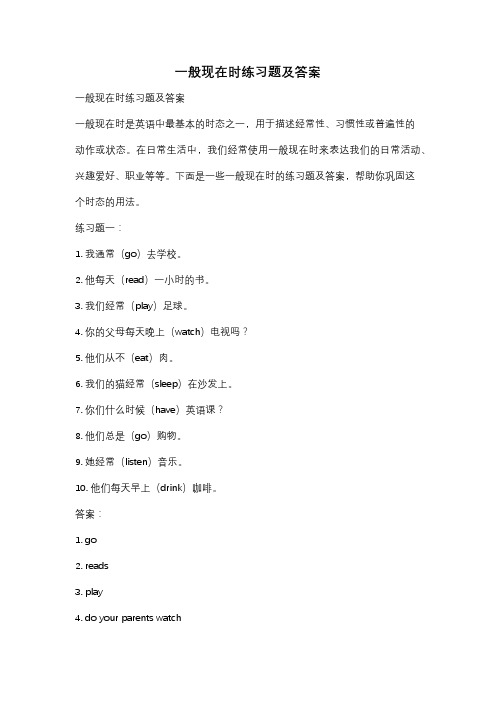
一般现在时练习题及答案一般现在时练习题及答案一般现在时是英语中最基本的时态之一,用于描述经常性、习惯性或普遍性的动作或状态。
在日常生活中,我们经常使用一般现在时来表达我们的日常活动、兴趣爱好、职业等等。
下面是一些一般现在时的练习题及答案,帮助你巩固这个时态的用法。
练习题一:1. 我通常(go)去学校。
2. 他每天(read)一小时的书。
3. 我们经常(play)足球。
4. 你的父母每天晚上(watch)电视吗?5. 他们从不(eat)肉。
6. 我们的猫经常(sleep)在沙发上。
7. 你们什么时候(have)英语课?8. 他们总是(go)购物。
9. 她经常(listen)音乐。
10. 他们每天早上(drink)咖啡。
答案:1. go2. reads3. play4. do your parents watch5. eat6. sleeps7. do you have8. go9. listens to10. do they drink练习题二:1. 你通常几点起床?2. 他们每周末去哪里?3. 你的朋友们喜欢什么运动?4. 你们的狗喜欢吃什么食物?5. 他们多久去一次健身房?6. 你们的邻居是干什么的?7. 你每天晚上做什么?8. 他们有多少个孩子?9. 你喜欢什么颜色?10. 他们通常什么时候吃晚饭?答案:1. What time do you usually get up?2. Where do they go on weekends?3. What sports do your friends like?4. What food does your dog like?5. How often do they go to the gym?6. What do your neighbors do?7. What do you do every evening?8. How many children do they have?9. What color do you like?10. When do they usually have dinner? 练习题三:1. 我们经常(go)购物。
英语一般现在时语法及练习题

英语一般现在时语法及练习题英语一般现在时语法及练习题在日常学习和工作中,我们很多时候都会有考试,接触到练习题,做习题在我们的学习中占有非常重要的位置,对掌握知识、培养能力和检验学习的效果都是非常必要的,你所见过的习题是什么样的呢?下面是店铺为大家整理的英语一般现在时语法及练习题,仅供参考,大家一起来看看吧。
英语一般现在时语法及练习题1现在一般时(present tense)概念:表示通常性、规律性、习惯性、真理性的状态或者动作(有时间规律发生的事件)的一种时间状态。
常用结构:1.主语+谓语+其他(表动作)It never snows in Australia in December.澳大利亚的12月里从来不下雪。
They usually go to school by bike.他们通常骑自行车上学。
He writes to his father twice a month.他每月写两次信给他爸爸。
2.主语+be+表语(表状态)He is a student.他是学生。
ⅠBe动词的一般现在时主语+be(am , is , are)+其它肯定句式:主语+be( am, is, are)+其它. 如,The color is blue.否定句式:主语+be(am, is, are) +not +其它.如,The color is not blue.一般疑问句:Be(am, is, are) +主语+其它?.注:在这种构成中,be动词有人称和数的变化,即要根据主语选用am / is / are。
Be动词分为单数和复数,am和is是表示单数,am只跟I搭配(除了I其余的单数都用is),are表示复数。
Ⅱ 实义动词的.一般现在时① 主语(第三人称单数)+动词(第三人称单数形式)+其它肯定句式:主语(第三人称单数)+动词(第三人称单数形式)+其它,如,He likes it否定句式:主语(第三人称单数)+doesn’t+动词(原形)+其它.如:He dosen't like it.一般疑问句:Does+主语(第三人称单数)+动词(原形)+其它? Does he like it?② 主语(除了第三人称单数)+动词(原形)+其它肯定句式:主语(除了第三人称单数)+动词(原形)+其它如:I like it 否定句式:主语(除了第三人称单数)+don’t+动词(原形)+其它.如:I don't like it.一般疑问句:Do+主语(除了第三人称单数)+动词(原形)+其它? Do you know it.注:do、don’t和does、doesn’t是构成一般现在时的助动词,其特点是要在其后跟动词的原形。
c初中英语一般现在时的用法和练习题

c初中英语一般现在时的用法和练习题一般现在时是英语中最基本的时态之一,用来描述经常发生的动作或存在的状态。
以下是一般现在时的用法和一些练习题,帮助学生更好地理解和运用这一时态。
# 一般现在时的用法:1. 描述日常习惯或规律性动作:例如,I usually wake up at 7 a.m.(我通常早上7点醒来)。
2. 表达客观事实或普遍真理:例如,The Earth revolves aroundthe Sun.(地球绕着太阳转)。
3. 描述永久性特征或状态:例如,Water boils at 100 degrees Celsius.(水在100摄氏度时沸腾)。
4. 用于时间、条件、让步状语从句:例如,If it rains, the match will be postponed.(如果下雨,比赛将被推迟)。
5. 表达命令、请求或建议:例如,Please close the door.(请关门)。
6. 用于某些固定表达:例如,Here comes the bus.(公交车来了)。
# 一般现在时的构成:- 主语 + 动词原形(I, you, we, they):例如,We play soccer every weekend.- 主语 + 动词的第三人称单数形式(he, she, it):例如,She watches TV every night.- 主语 + 动词原形 + 不定冠词 + 名词:例如,A cat sleeps 16 hours a day.# 练习题:1. 填空题:请在括号中填入正确的动词形式。
- My father (work) ______ in a bank.- The sun (rise) ______ in the east and (set) ______ in the west.2. 改错题:找出句子中的错误并改正。
- She don't like to eat vegetables. (正确形式:She doesn't like to eat vegetables.)3. 选择题:选择正确的选项完成句子。
(完整版)一般现在时讲解+练习
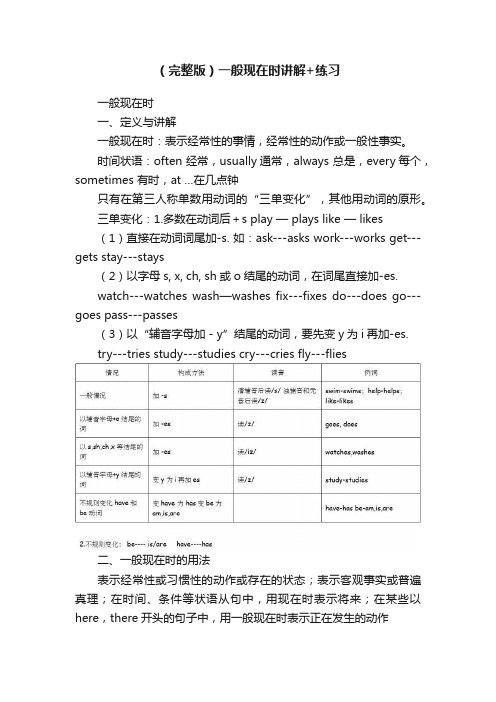
(完整版)一般现在时讲解+练习一般现在时一、定义与讲解一般现在时:表示经常性的事情,经常性的动作或一般性事实。
时间状语:often 经常,usually通常,always 总是,every每个,sometimes 有时,at …在几点钟只有在第三人称单数用动词的“三单变化”,其他用动词的原形。
三单变化:1.多数在动词后+s play — plays like — likes(1)直接在动词词尾加-s. 如:ask---asks work---works get---gets stay---stays(2)以字母s, x, ch, sh或o结尾的动词,在词尾直接加-es.watch---watches wash—washes fix---fixes do---does go---goes pass---passes(3)以“辅音字母加 - y”结尾的动词,要先变y为i再加-es.try---tries study---studies cry---cries fly---flies二、一般现在时的用法表示经常性或习惯性的动作或存在的状态;表示客观事实或普遍真理;在时间、条件等状语从句中,用现在时表示将来;在某些以here,there开头的句子中,用一般现在时表示正在发生的动作当主语是第三人称单数时:1、动词变相应的第三人称单数形式2、肯定句主语+动词s+其它3、否定句主语+doesn't+动词原形+其它4、一般疑问句Does+主语+动词原形+其它5、肯定回答 Yes,主语+does6、否定回答 No,主语+doesn't7、特殊疑问句特殊疑问词+一般疑问句当主语不是第三人称单数时:1、肯定句主语+动词原形+其它2、否定句主语+don't+动词原形+其它3、一般疑问句 Do+主语+动词原形+其它4、要注意,句式结构错则全都错。
5、谓语动词的形式:do/does一般现在时练习一、用所给词的正确形式填空1. We often ___________ (play) on the playground.2. He _________ (get) up at six o’clock.3. __________you _________ (brush) your teeth every morning.4. What____ (do) he usually _____ (do) after school?5. Danny _______ (study) English, Chinese, Math, Science and Art at school.6. Mike sometimes __________ (go) to the park with his sister.7. At eight at night, she ________ (watch) TV with his parents.8. ________ Mike________ (read) English every day?9. How many lessons ______your classmate____ (have) on Monday?10. What time ____his mother_________ (do) the housework?11. He often ______ (have) dinner at home. 12. Daniel and Tommy___ (be) in Class One. 13. We____ (not watch) TV on Monday. 14. Nick _____(not go) to the zoo on Sunday.15. They______ (like) the World Cup? 16. What ____they often ____ (do) on Saturdays17. Your parents________ (read) newspapers every day?18. The girl______ (teach) us English on Sundays.19. She and I _______ (take) a walk together every evening.20. There_______ (be) some water in the bottle. 21. Mike ______ (like) cooking.22. They_______ (have) the same hobby. 23. My aunt______ (look) after her baby carefully.24. You always____ (do) your homework well. 25. I_____ (be) ill. I’m sta ying in bed.26. She_____ (go) to school from Monday to Friday. 27. Liu Tao _____ (do) not like PE.28. The child often______ (watch) TV in the evening.29. Su Hai and Su Yang ______(have) eight lessons this term.30. -What day ______(be) it today? -It’s Saturday.31. Don’t make a noise. Grandpa __________ (sleep).32. Tom’s family__________ (watch) TV.33. It ________ (take) me two hours to finish my homework last night.34. What ______ your mother _______ (do) every evening? She_______ (wash) clothes.35. _______ it ______ (rain) every day?36. What _______ (do) you _______ on Sundays? We ________ (play) football.37. There ________ (be) a football match on TV every morning.38. They often ________ (visit) the Great Wall.39. Who _______ (dance) the best in your class?40. He _____________ (not come).41. The earth __________ (move) round the sun.42 She ________ (buy) a sweater.43. Mr. Wang often______ (go) to Shanghai.二、改句子1. Do you often play football after school? (肯定回答)_______________________________2. I have many books. (改为否定句)_______________________________3. Gao Shan's sister likes playing table tennis (改为否定句)________________________4. She lives in a small town near New York. (改为一般疑问句)________________________5. I watch TV every day. (改为一般疑问句)________________________6. David has a goal. (改为一般疑问句)________________________7. We have four lessons.(否定句)________________________8. Nancy doesn’t run fast (肯定句)________________________9. My dog runs fast. (一般疑问句) ________________________(把10—14小题变否定句,一般疑问句和划线提问)10. Mike has two letters for him. ________________________11. I usually play football on Friday afternoon.________________________12. Su Yang usually washes some clothes on Saturday. ________________________13. Mingming usually waters the flowers every day. ________________________14. Tom does his homework at home. ________________________三、写出下列动词的第三人称单数形式:1. wash_________ match _______ guess______ study______finish_________ go________ snow______ carry_________2. stop______ see________ drive ________let_______ carry______keep_____ join______ find_______ think________ teach______ catch______3. stay_______ begin______ forget_______ lie________ die _______run_______ prefer______ give________ ring_______ dance______ hope_______四、单项选择:1. There _____ an English film at the cinema now.A. will haveB. is going to haveC. is going to beD. is2. The picture _______ nice. A. looks B. is looked C. look D. is looking3. She ______ down and soon falls asleep. A. live B. lain C. laidD. sits4. They _____ the office in time very morning. A. reach to B. arrived C. went D. get to5. We shall go to Shanghai on business before you _____ back next week.A. will comeB. cameC. would comeD. come6. The plane ______ over there. A. is B. are C.am D. was7. I see her ____ the room this morning. A. to enter B. enteredC. enterD. enters8. The teacher ________us to come to school on time. A. ask B. asking C. asks D. asked9. John always ______ others. A. help B. helping C. helps D. to help10. He ______for eight hours every day. A. working B. to workC. worksD. worked11. You’d better ______ at home and ______ your homework.A. to stay, doB. stay, doC. to stay, to doD. stay, to do12. He sits down and ______ a rest. A. having B. have C. to haveD. has13. Uncle Wang never ______ a cake. A. make B. to make C. making D. makes五、请写出下列句子1.他每天早上七点乘公交车去上学。
(完整版)小学英语一般现在时用法及习题(含答案)

4、have_______【No. 2】一般现在时的变化 1. be动词的变化。
否定句:主语+ be + not +其它。
如:He is not a worker.他不是工人。
一般疑问句:Be +主语+其它。
如:-Are you a student? -Yes. I am. / No, I'm not. 特殊疑问句:疑问词+一般疑问句。
如:Where is my bike? 2.行为动词的变化。
否定句:主语+ don't( doesn't ) +动词原形(+其它)。
如: I don't like bread. 当主语为第三人称单数时,要用doesn't构成否定句。
如: He doesn't often play. 一般疑问句:Do( Does ) +主语+动词原形+其它。
如: - Do you often play football? - Yes, I do. / No, I don't. 当主语为第三人称单数时,要用does构成一般疑问句。
如: - Does she go to work by bike? - Yes, she does. / No, she doesn't.【No. 3】特殊疑问句:疑问词+一般疑问句。
如:How does your father go to work?一、肯定句改否定句的方法——一步法1、在be动词后加not。
如:is not ,are not ,am not,was not,were not;2、在can,should,will等后加not。
如:cannot,should not,will not;3、上述都没有的,在动词前加助动词否定形式don’t/doesn’t/didn’t。
4、some 改成any。
二、肯定句改一般疑问句的方法——三步法1、把be动词放在句首,剩下的照抄,(some 改成any,my改成your等)句点改成问号。
一般现在时态讲解及练习(精简版,错题版)

一般现在时态一、一般现在时的用法1) 表示经常性、习惯性的动作或存在的状态。
通常与副词sometimes, often, usually, always, everyday (year, month ), once (twice, three times) a day, 等等频率副词(时间状语)连用。
. They usually go to school by bike.I take the medicine three times a day. 实义动词表示“动作”She helps her mother once a week.Mary’s father is a policeman.There are 50 students in my class. Be动词表示“状态”He is very busy now.be 、do不能放一起,如果非要放一起,do后要加ing, 变成现在进行时。
2) 表示主语的特征、性格、爱好等。
. I work hard.I like watching TV.3) 表示客观真理:. There are seven days in a week.The moon moves round the earth.The sun rises in the east and sets in the west every day.Tomorrow is Tuesday.二、一般现在时的句子转换:三、一般现在时的结构:“主语+谓语+其它”,有时为了起强调作用,时间状语也可提前.三单变化:1)多数在动词后+s :play — plays like — likes ask---asks work---works get---gets stay---stays2)以字母s, x, ch, sh或o结尾的动词,+-es:watch---watches wish---wishes fix---fixes do---does go---goes pass---passes 3)以“辅音字母加- y”结尾的动词,要先变y为i+-es.try---tries study---studies cry---cries fly---flies不规则变化:be---- is are have----has做题时常见错误如下:1)、be动词与行为动词同时出现在句子中例:We are plant (plant) the trees in spring.·答案:plant2)、单三人称形式易出错例:1 He plaies (play) football very well.2 Danny gos (go) to school at 7:10.答案:1 plays 2 goes解析:1以辅音字母加y结尾的动词变单三人称形式才能把y换成i再加es;2与名词变复数不同,变单三人称形式以o结尾的词要加es.3)、在句式变换时易出错:例:1 Does Jenny has (has) a good friend2 Brian doesn’t lives (not live) in China.答案:1 Does have 2 doesn’t live解析:口诀:“见助动,用原形”。
小升初英语一般现在时特殊用法练习题50题(带答案)

小升初英语一般现在时特殊用法练习题50题(带答案)1.She_____her homework after school every day.A.doB.doesC.doingD.is doing答案解析:B。
一般现在时中,主语是第三人称单数时,动词要用第三人称单数形式。
do 的第三人称单数形式是does。
A 选项do 是动词原形;C 选项doing 是现在分词形式;D 选项is doing 是现在进行时。
2.He_____to school by bike every morning.A.goB.goesC.goingD.is going答案解析:B。
一般现在时,主语是第三人称单数时,谓语动词要用第三人称单数形式。
go 的第三人称单数形式是goes。
A 选项go 是动词原形;C 选项going 是现在分词形式;D 选项is going 是现在进行时。
3.We_____English classes on Monday.A.haveB.hasC.havingD.is having答案解析:A。
一般现在时,主语是we,谓语动词用原形。
B 选项has 是第三人称单数形式;C 选项having 是现在分词形式;D 选项is having 是现在进行时。
4.They_____games after school.A.playB.playsC.playingD.is playing答案解析:A。
一般现在时,主语是they,谓语动词用原形。
B 选项plays 是第三人称单数形式;C 选项playing 是现在分词形式;D 选项is playing 是现在进行时。
5.My mother_____cooking every day.A.likeB.likesC.likingD.is liking答案解析:B。
一般现在时,主语是第三人称单数时,谓语动词要用第三人称单数形式。
like 的第三人称单数形式是likes。
一般现在时的用法及练习题(带答案)
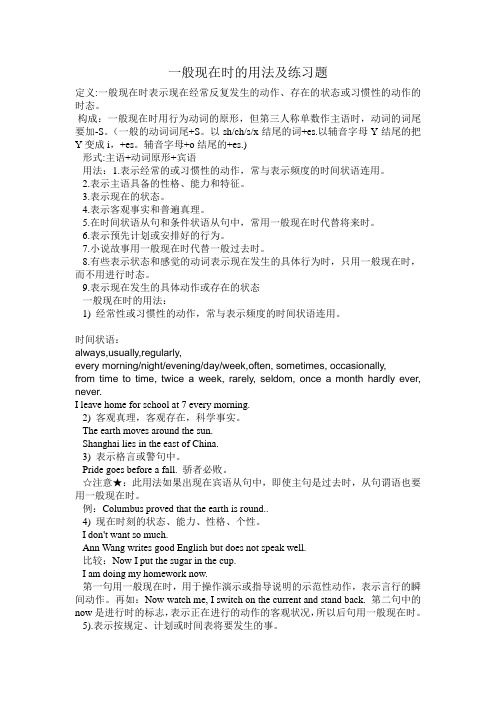
一般现在时的用法及练习题定义:一般现在时表示现在经常反复发生的动作、存在的状态或习惯性的动作的时态。
构成:一般现在时用行为动词的原形,但第三人称单数作主语时,动词的词尾要加-S。
(一般的动词词尾+S。
以sh/ch/s/x结尾的词+es.以辅音字母Y结尾的把Y变成i,+es。
辅音字母+o结尾的+es.)形式:主语+动词原形+宾语用法:1.表示经常的或习惯性的动作,常与表示频度的时间状语连用。
2.表示主语具备的性格、能力和特征。
3.表示现在的状态。
4.表示客观事实和普遍真理。
5.在时间状语从句和条件状语从句中,常用一般现在时代替将来时。
6.表示预先计划或安排好的行为。
7.小说故事用一般现在时代替一般过去时。
8.有些表示状态和感觉的动词表示现在发生的具体行为时,只用一般现在时,而不用进行时态。
9.表示现在发生的具体动作或存在的状态一般现在时的用法:1) 经常性或习惯性的动作,常与表示频度的时间状语连用。
时间状语:always,usually,regularly,every morning/night/evening/day/week,often, sometimes, occasionally,from time to time, twice a week, rarely, seldom, once a month hardly ever, never.I leave home for school at 7 every morning.2) 客观真理,客观存在,科学事实。
The earth moves around the sun.Shanghai lies in the east of China.3) 表示格言或警句中。
Pride goes before a fall. 骄者必败。
☆注意★:此用法如果出现在宾语从句中,即使主句是过去时,从句谓语也要用一般现在时。
例:Columbus proved that the earth is round..4) 现在时刻的状态、能力、性格、个性。
七年级英语语法:一般现在时及练习
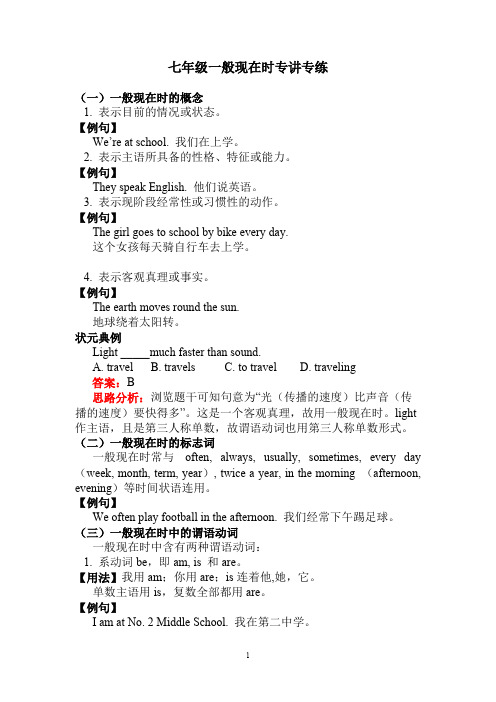
七年级一般现在时专讲专练(一)一般现在时的概念1. 表示目前的情况或状态。
【例句】We’re at school. 我们在上学。
2. 表示主语所具备的性格、特征或能力。
【例句】They speak English. 他们说英语。
3. 表示现阶段经常性或习惯性的动作。
【例句】The girl goes to school by bike every day.这个女孩每天骑自行车去上学。
4. 表示客观真理或事实。
【例句】The earth moves round the sun.地球绕着太阳转。
状元典例Light _____much faster than sound.A. travelB. travelsC. to travelD. traveling答案:B思路分析:浏览题干可知句意为“光(传播的速度)比声音(传播的速度)要快得多”。
这是一个客观真理,故用一般现在时。
light 作主语,且是第三人称单数,故谓语动词也用第三人称单数形式。
(二)一般现在时的标志词一般现在时常与often, always, usually, sometimes, every day (week, month, term, year), twice a year, in the morning (afternoon, evening)等时间状语连用。
【例句】We often play football in the afternoon. 我们经常下午踢足球。
(三)一般现在时中的谓语动词一般现在时中含有两种谓语动词:1. 系动词be,即am, is 和are。
【用法】我用am;你用are;is连着他,她,它。
单数主语用is,复数全部都用are。
【例句】I am at No. 2 Middle School. 我在第二中学。
You are a doctor. 你是一名医生。
It is my cat. 它是我的小猫。
状元典例The boys _____ students.A. amB. isC. areD. be答案:C思路分析:根据主语the boys是复数可知谓语动词应用复数形式。
一般现在时知识点和练习(附答案),排版正,可直接打印
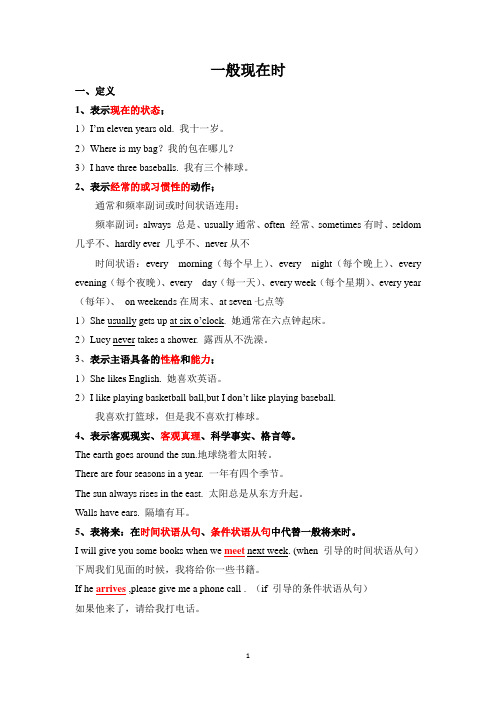
一般现在时一、定义1、表示现在的状态;1)I’m eleven years old. 我十一岁。
2)Where is my bag?我的包在哪儿?3)I have three baseballs. 我有三个棒球。
2、表示经常的或习惯性的动作;通常和频率副词或时间状语连用:频率副词:always 总是、usually通常、often 经常、sometimes有时、seldom 几乎不、hardly ever 几乎不、never从不时间状语:every morning(每个早上)、every night(每个晚上)、every evening(每个夜晚)、every day(每一天)、every week(每个星期)、every year (每年)、on weekends在周末、at seven七点等1)She usually gets up at six o’clock. 她通常在六点钟起床。
2)Lucy never takes a shower. 露西从不洗澡。
3、表示主语具备的性格和能力;1)She like s English. 她喜欢英语。
2)I like playing basketball ball,but I don’t like playing baseball.我喜欢打篮球,但是我不喜欢打棒球。
4、表示客观现实、客观真理、科学事实、格言等。
The earth goes around the sun.地球绕着太阳转。
There are four seasons in a year. 一年有四个季节。
The sun always rises in the east. 太阳总是从东方升起。
Walls have ears. 隔墙有耳。
5、表将来:在时间状语从句、条件状语从句中代替一般将来时。
I will give you some books when we meet next week. (when 引导的时间状语从句)下周我们见面的时候,我将给你一些书籍。
2024年初中英语语法重点一般现在时的用法和练习详解

一般现在时(Simple Present Tense)表示经常性或习惯性的动作、客观事实、普遍真理等,下面详细介绍一般现在时的用法和练习。
一、肯定句的用法:1. 第三人称单数主语在一般现在时的肯定句中需要加s或es。
例如:- She studies English every day. (她每天学习英语。
)- He eats breakfast at 8 o'clock. (他八点吃早饭。
)2.一般现在时的肯定句中可以使用频度副词,表示动作发生的频率。
例如:- I often go swimming on weekends. (我经常在周末去游泳。
)- They always arrive early for class. (他们上课总是很早到达。
)3.一般现在时的肯定句中可以使用时间状语,表示动作发生的时间。
例如:- We usually have dinner at 7 o'clock. (我们通常七点吃晚饭。
) - The bus leaves the station every half an hour. (这辆公交车每隔半小时离开车站。
)二、否定句的用法:1. 将助动词do或does放在句首,再加上not构成否定句。
- She does not like coffee. (她不喜欢咖啡。
)- They do not play basketball on Sundays. (他们不在星期天打篮球。
)2. 第三人称单数主语在否定句中也需要加s或es。
例如:- He does not understand the question. (他不明白这个问题。
) - The bird does not sing in the night. (这只鸟不在夜晚唱歌。
)3.否定句中的频度副词和时间状语的位置也是在助动词后面。
例如:- I do not often watch TV. (我不经常看电视。
小升初英语一般现在时特殊用法练习题50题

小升初英语一般现在时特殊用法练习题50题1.She ______ to school by bus every day.A.goB.goesC.goingD.to go答案:B。
“every day”表明是一般现在时,主语是“she”,第三人称单数,谓语动词要用第三人称单数形式goes。
A 选项go 是原形,主语不是第三人称单数时使用;C 选项going 不能单独作谓语;D 选项to go 是动词不定式,也不能单独作谓语。
2.I ______ my homework after school.A.doB.doesC.doingD.to do答案:A。
“after school”经常发生的动作,一般现在时,主语是“I”,谓语动词用原形do。
B 选项does 是第三人称单数形式;C 选项doing 是现在分词;D 选项to do 是动词不定式。
3.He ______ football on weekends.A.playB.playsC.playing答案:B。
“on weekends”表明是一般现在时,主语是“he”,第三人称单数,谓语动词要用第三人称单数形式plays。
A 选项play 是原形;C 选项playing 是现在分词;D 选项to play 是动词不定式。
4.We ______ books in the library.A.readB.readsC.readingD.to read答案:A。
一般现在时,主语是“we”,谓语动词用原形read。
B 选项reads 是第三人称单数形式;C 选项reading 是现在分词;D 选项to read 是动词不定式。
5.They ______ TV in the evening.A.watchB.watchesC.watchingD.to watch答案:A。
“in the evening”一般现在时,主语是“they”,谓语动词用原形watch。
一般现在时练习题基础、提高、难题_汇总(含答案)1

一般现在时练习题基础、提高、难题_汇总(含答案)1一、一般现在时1.— ________ you like hamburgers?— No, I ________.A. Are; am notB. Do; am notC. Are; don'tD. Do; don't【答案】 D【解析】【分析】此题考查一般现在时的一般疑问句句式。
句中有实义动词like喜欢,所以句首应该用助动词。
主语为you你,助动词应该用do。
回答也应该用do。
故选D。
【点评】考查一般疑问句及其作答。
2.My father is a tea lover. He __________ tea every day.A. drinkB. drinksC. drankD. will drink【答案】 B【解析】【分析】句意:我爸爸是一个茶痴,他每天都喝茶。
every day表明时态是一般现在时,主语是he,所以drink用drinks,C是一般过去时;D是一般将来时,故选B。
【点评】考查一般现在时,注意平时识记其标志词及动词的单三式。
3.The children will climb the mountain if it________ tomorrow.A. won't rainB. didn't rainC. isn't rainingD. doesn't rain【答案】 D【解析】【分析】句意:如果明天不下雨,孩子们会去爬山。
if 引导的条件状语从句遵循主将从现的原则,主句用一般将来时,从句用一般现在时,从句是一个否定句,含有实义动词rain的否定句,要借助助动词don't/doesn't构成,主语是it,助动词用doesn't,故选D。
【点评】考查if引导的条件状语的时态。
注意句子涉及到if引导的条件状语从句的用法。
4.If he _____ the money, he _____ a lot of clothes.A. has; will buyB. had; boughtC. had; would buyD. had; will buy【答案】 A【解析】【分析】句意:如果他有钱,他会买许多衣服。
- 1、下载文档前请自行甄别文档内容的完整性,平台不提供额外的编辑、内容补充、找答案等附加服务。
- 2、"仅部分预览"的文档,不可在线预览部分如存在完整性等问题,可反馈申请退款(可完整预览的文档不适用该条件!)。
- 3、如文档侵犯您的权益,请联系客服反馈,我们会尽快为您处理(人工客服工作时间:9:00-18:30)。
《一般现在时的特殊用法》进阶练习
I. 选择题
1. Here ____ the bus.
A. is coming
B. comes
C. Come
D. came
2. The final exam _____ next week.
A. takes place
B. is taking place
C. will take place
D. is to take place
3.The story ____ in the year 1937.
A. Begins
B. Began
C. has began
D. was began
II. 根据中文完成句子。
1. Mary ____ you told her to come over here.(说)
2. The train _____at 12:00.(离开)
参考答案
1. B
2. A
3. A
4. says
5.leaves
解析:
1. 在倒装句中,用一般现在时表进行。
故选B。
2. 表示按时间拟定或安排好的事情,或要发生的动作用一般现在时。
例如(stay, take place, begin,leave) 故选A。
3. 用于表述过去故事,用一般现在时。
故选A。
4. 某些动词(tell, say, hear, learn, gather等)表示不确定的过去时间时用一般现在时。
故填tells。
5. 表示按时间拟定或安排好的事情,或要发生的动作用一般现在时。
例如(stay, take place, begin, leave)故填leaves。
